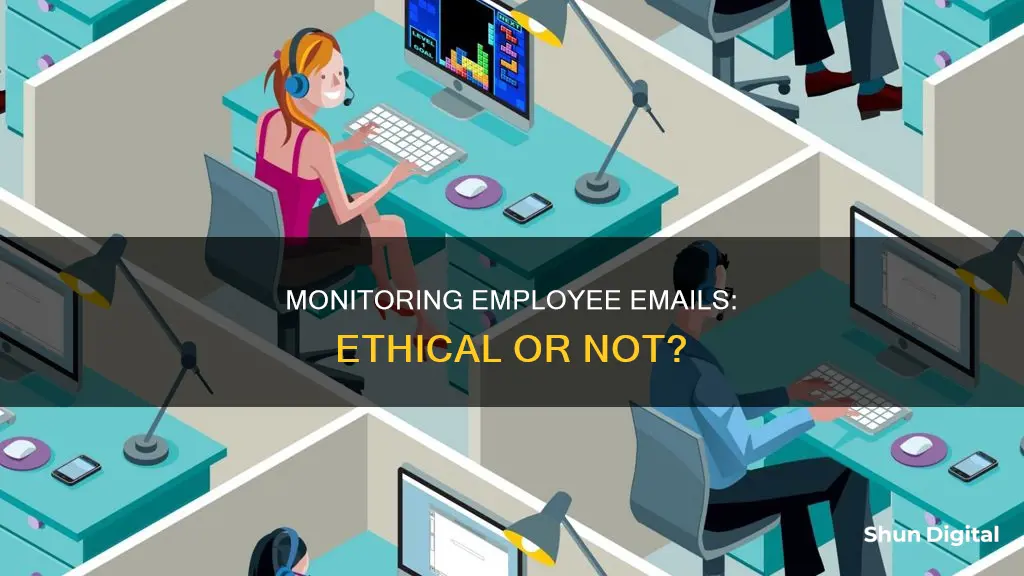
The number of companies monitoring their employees' internet usage is increasing. This is because employees' internet usage can impact productivity and overall performance. However, some studies suggest that surfing the web during work hours keeps employees motivated and engaged. So, should managers monitor their employees' email and internet usage?
What You'll Learn

Impact on productivity
Monitoring employees' email and internet usage is a highly debated topic, with varying opinions on its impact on productivity. Some argue that it is necessary to maintain employee productivity, while others suggest that it may have a negligible effect or even improve motivation and engagement.
Arguments for Monitoring
Managers may argue that monitoring is essential to ensure employees are not wasting time on personal tasks during work hours. Research shows that a significant percentage of employees use social media, shop online, or browse irrelevant websites during work time, which can impact their productivity and the company's revenue. For example, employees spending excessive time on personal emails or social media can lead to lost revenue and reduced productivity.
Additionally, monitoring can help prevent security risks and protect sensitive company data. Unchecked internet usage leaves companies vulnerable to insider cybersecurity threats, malware, viruses, and data breaches. By monitoring, employers can ensure employees are not engaging in activities that compromise company systems and data.
Arguments Against Monitoring
On the other hand, some studies suggest that internet usage during work hours can serve as a boredom-coping mechanism and may not significantly impact productivity. In fact, some employees argue that it helps keep them motivated and engaged. Restricting internet usage too much may negatively impact employee morale and lead to decreased productivity.
Balancing Productivity and Privacy
The key to this debate lies in finding a balance between monitoring for legitimate business purposes and respecting employee privacy. Companies should aim for transparency and ethical monitoring practices, clearly communicating their policies to employees.
By setting clear expectations, providing training, and using appropriate software and technology, employers can improve productivity and security without invading employee privacy. This includes allowing some personal internet usage, such as during breaks or lunch, and providing designated computers for personal use to prevent security risks.
In conclusion, monitoring employees' email and internet usage can impact productivity, but the effect depends on how it is approached. A balanced and ethical monitoring strategy, with clear policies and employee consent, can help improve productivity and security while maintaining employee trust.
Monitoring Power Usage: Simple Steps for Your Home
You may want to see also

Security risks
The use of email and the internet in business brings a range of security risks. Firstly, malicious unauthorised access and intentional or unintentional acts by authorised users can threaten the security of IT systems. This includes the risk of phishing attacks, where cybercriminals masquerade as legitimate entities to acquire personal information. Phishing can lead to identity theft, and access to online accounts and sensitive company information. Spam emails, or junk mail, can also cause issues, as they may contain malicious links or attachments. Viruses, worms, trojan horses, and spyware are other common security threats, which can be inadvertently downloaded by employees. These can spread throughout a company's network, causing significant damage to computer operations and allowing unauthorised access to sensitive information.
To mitigate these risks, companies can implement various security measures. Authentication, access control, encryption, firewalls, and intrusion detection systems can all be utilised to protect IT systems and prevent unauthorised access. Anti-virus software is also essential for detecting and preventing viruses. Additionally, staff awareness and training are crucial. Employees should be educated about potential scams, common cyber threats, and safe internet usage practices.
By implementing these security measures and promoting a culture of cybersecurity awareness, companies can minimise the security risks associated with email and internet usage.
Monitoring Live WiFi Usage: Archer C7 Guide
You may want to see also

Ethical considerations
Monitoring employee email and internet usage is a complex issue that raises several ethical concerns. While organizations have legitimate reasons to monitor employee activity, such as protecting sensitive data and maintaining productivity, they must also respect their employees' privacy and adhere to legal obligations.
One key ethical consideration is transparency. Being transparent about monitoring practices is crucial for building trust with employees. Organizations should inform their employees about monitoring policies and obtain their consent, especially when dealing with personal devices. Transparency can also help employees understand the rationale behind monitoring and encourage them to take responsibility for their online behavior.
Another ethical consideration is the extent of monitoring. Organizations should aim for a balanced approach that respects employee privacy while achieving legitimate business purposes. This includes limiting monitoring to specific devices, times, and activities, such as tracking company-owned devices during working hours only. Overly invasive practices, such as constant real-time monitoring or capturing screenshots, may be perceived as an invasion of privacy and require careful evaluation and justification.
Additionally, organizations should ensure that any data collected through monitoring is handled securely and anonymously when possible. This includes implementing strict access controls, encrypting stored data, and adhering to data retention policies. By treating employee data with care, organizations can demonstrate their commitment to protecting their employees' privacy rights.
Furthermore, ethical considerations extend to how the monitored data is utilized. Organizations should primarily use the data for constructive feedback, counseling, and training employees rather than solely for punitive action. This approach can help foster a culture of trust and encourage employees to improve their online habits.
Finally, organizations should also consider the potential impact of monitoring on employee morale and trust. While monitoring may help identify security risks and improve productivity, it could also create a sense of distrust and negatively affect employee motivation and satisfaction. Therefore, organizations should carefully weigh the benefits of monitoring against the potential harm to the employer-employee relationship.
In summary, ethical considerations in monitoring employee email and internet usage include transparency, respecting privacy, secure data handling, constructive use of data, and maintaining a positive employer-employee relationship. Organizations should strive for a balanced approach that addresses legitimate business needs while safeguarding the rights and trust of their employees.
Monitoring GPU Usage: A Comprehensive Guide to Tracking Performance
You may want to see also

Legal compliance
From a legal perspective, employers are allowed to monitor the emails sent within their organization. However, several companies have been sued as a result of doing so. As such, it is important to consider the ethical implications of monitoring employee email and internet usage.
In the US, broad monitoring is generally legal if employees are notified. Canada and Australia have stronger workplace privacy laws, which limit surveillance without cause. Explicit consent is advisable in these countries. The EU has stringent worker privacy safeguards, and monitoring policies must be limited to legitimate business needs.
Companies should establish comprehensive internet use policies for monitoring, keeping business needs, legal requirements, and ethical concerns in mind. For example, stating upfront what data will be collected, who can access it, and how it will be used. This should include details such as the retention period.
Employees must be fully informed and consent to monitoring practices. Transparency is key, and employees should sign consent statements explicitly permitting monitoring and acknowledging policies.
Monitoring must be limited to the minimum data needed to improve productivity and security. Avoid overly invasive practices without justification. For example, only enable practices such as keystroke logging for roles with access to sensitive data. Restrict screenshot capture to work devices and working hours only.
Collected data should be anonymized where possible, and avoid tying data to individual employees unless necessary. Mask employee identities in reports for managers unless individually identifiable data is required.
Data Security and Privacy
To secure monitored data, organizations should:
- Encrypt stored data and transmit over secure connections
- Implement access controls to limit data visibility to authorized personnel only
- Use multi-factor authentication to add an extra layer of protection
- Implement data retention policies to delete logs after a defined period, reducing the risk of a data breach
- Anonymize data where possible, scrubbing usernames and other personal details to reduce privacy impacts
- Add audit controls for all access to monitoring data, with detailed activity logs to deter internal misuse
Balancing Productivity and Privacy
Employers must determine an appropriate balance between monitoring for legitimate business purposes and respecting employee privacy. For example, restrict social media use to break times, rather than banning it outright during work hours.
Seek employee input when creating policies to address their concerns proactively. Anonymous surveys can be useful for this. Provide clear guidance on acceptable vs prohibited internet use, ensuring policies are not arbitrarily restrictive. Categorize websites and applications as 'prohibited', 'discouraged', 'allowed', and 'encouraged'.
Use collected data primarily for constructive feedback to employees, rather than punitive action. Counseling should be the primary recourse for policy violations, with discipline reserved for the most serious cases. First-time minor infractions should lead to a discussion, not a formal warning.
Remote Employee Devices
Monitoring remote employees who use personal or company-issued devices outside the corporate network is more complex. Best practices include:
- Installing monitoring software on all company-issued devices
- Using VPNs to route internet traffic back to the corporate network for better monitoring
- For personal devices, gain consent from employees to install monitoring agents, if legally permissible
- Limit monitoring to company activities and avoid overreach into personal activity and sites used on personal time
- Only enable tracking during employee work hours and disable it outside of these times
- Alternatively, prohibit the use of personal devices for work altogether and provide company devices
Medical Device Safety Compliance: Who Monitors Usage?
You may want to see also

Employee privacy
Transparency and Consent
Transparency and consent are fundamental principles when it comes to employee privacy. Monitoring employees' internet and email usage without their knowledge or consent can lead to trust issues and negatively impact morale. It is essential that organizations are transparent about their monitoring practices and obtain legally required consent from their employees. Informing employees about the extent and methods of monitoring helps set clear expectations and promotes a culture of trust and accountability.
Limiting Monitoring Scope
To respect employee privacy, organizations should limit the scope of monitoring to what is necessary for legitimate business purposes. This includes restricting monitoring to specific devices, times, and activities. For example, monitoring can be limited to company-owned devices during working hours, with monitoring disabled outside of work hours. Additionally, organizations should avoid overly invasive practices and collect only the minimum amount of data needed to meet their objectives.
Anonymization and Data Security
Whenever possible, organizations should anonymize collected data by removing personally identifiable information. This helps protect employee privacy while still allowing for productive insights and analysis. Additionally, strict data security measures are essential to safeguard the collected data. This includes encryption, access controls, and data retention policies to prevent unauthorized access and reduce the risk of data breaches.
Constructive Feedback and Counseling
Using employee monitoring data for constructive feedback and counseling is a more respectful approach than solely relying on punitive actions. Discussing insights from usage data during one-on-one meetings can help guide employees towards improving their habits. Counseling can be the primary recourse for policy violations, with discipline reserved for egregious or repeated cases. This approach demonstrates a commitment to employee development and well-being while still enforcing necessary boundaries.
Employee Input and Policy Development
Involving employees in the development of monitoring policies can help address privacy concerns proactively. Organizations can conduct anonymous surveys to understand employee perspectives and tailor policies accordingly. By seeking employee input, organizations can create policies that balance productivity and privacy effectively.
In conclusion, respecting employee privacy when monitoring email and internet usage involves a combination of transparency, consent, limited monitoring scope, data anonymization, secure data handling, constructive feedback, and employee involvement in policy development. By considering these aspects, organizations can maintain a productive and ethical work environment while respecting the rights of their employees.
Monitoring Data Usage on Your iPhone: A Quick Guide
You may want to see also
Frequently asked questions
Yes, managers should monitor employee email and internet usage to ensure employees are not wasting time at work, which can create serious business problems and affect the company's revenue.
Monitoring employee email and internet usage may temporarily reduce employee morale as they may not feel free when using the computer. However, over time, employees may get used to it and understand that the monitoring is done to improve business efficiency and effectiveness.
Monitoring employee email and internet usage raises ethical concerns, such as the potential loss of trust between employees and management. It is important to consider the extent to which monitoring may invade employee privacy and affect morale.
Monitoring can help prevent interruptions, improve employee focus, and increase productivity by reducing time wasted on non-work-related activities. It can also help identify and address any illegal or inappropriate activities conducted by employees using company resources.
Monitoring may be seen as an invasion of privacy and may negatively impact employee morale and trust. Additionally, it may not always be effective, as employees may find ways to circumvent monitoring or simply adapt their behaviour to appear more productive.







